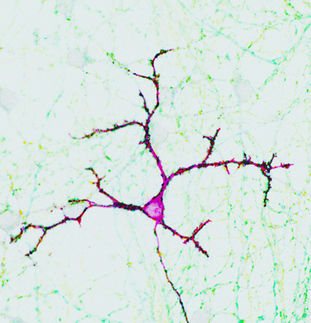Study suggests new way to treat rare autism disorder
A protein that plays a powerful role in learning and memory may be a key to improving treatment of a rare autism spectrum disorder called Pitt-Hopkins syndrome (PTHS), a new study suggests.
J. David Sweatt , Ph.D., the new chair of the Department of Pharmacology in the Vanderbilt University School of Medicine, has been studying the protein, called transcription factor 4 or Tcf4, for several years.
Sweatt and his colleagues at the University of Alabama at Birmingham (UAB) report that mice deficient in Tcf4 exhibit impairments in social interaction, vocalization, learning and memory characteristic of PTHS.
The impairments were “normalized” when the mice were given small-molecule drugs called HDAC inhibitors, which alter Tcf4-associated gene expression in the brain. The finding suggests that “broadly acting, epigenetically targeted therapeutics … might be particularly beneficial in PTHS patients,” the researchers concluded.
“We are quite excited by these findings, said Sweatt, a Vanderbilt University-trained pharmacologist who formerly chaired the Department of Neurobiology and directed the McKnight Brain Institute, both at UAB.
“Pitt-Hopkins Syndrome is an orphan disease that has not been extensively studied,” he said. “Having identified one potential avenue for possible therapeutics is an important step forward.”
Epigenetics refers to environmental factors that affect DNA transcription, the read-out of the genetic code, and thus gene expression. For example, histone deacetylase (HDAC) enzymes help regulate the way DNA is packaged and transcribed in part through acetylation, by adding acetyl groups to the histone proteins that coordinate gene structure.
Transcription factors like Tcf4 adjust the transmission of signals across the synapses, or gaps between nerve cells, a phenomenon known as synaptic plasticity. A type of synaptic plasticity called long-term potentiation, or LTP, is associated with the brain’s ability to learn, acquire language and lay down memory.
It’s been known for some time that Tcf4 exerts its effects on transcription by attracting HDACs. Drugs called HDAC inhibitors have been long used in psychiatry and neurology to stabilize mood and prevent epileptic seizures. More recently they have been studied as possible treatments for cancer, Alzheimer’s disease and depression.
Through their mouse model, Sweatt and his colleagues connected the observed effects of Tcf4 and HDACs on gene expression in the brain. Their study adds credence to the notion that chemical modification of DNA and DNA packaging can result in to long-lasting behavioral change, even post-developmentally.
Future studies are planned to further investigate the possible use of currently available FDA-approved HDAC inhibitors in the Pitt-Hopkins mouse model, Sweatt said.
The study was supported by the Defense Advanced Research Projects Agency (DARPA), the National Institutes of Health (grants MH57014 and MH104158), Civitan International, the Simons Foundation, McKnight Brain Research Foundation and the Pitt-Hopkins Research Foundation.
Original publication
Andrew J. Kennedy et al.; "Tcf4 Regulates Synaptic Plasticity, DNA Methylation, and Memory Function"; Cell Reports; 2016
Most read news
Original publication
Andrew J. Kennedy et al.; "Tcf4 Regulates Synaptic Plasticity, DNA Methylation, and Memory Function"; Cell Reports; 2016
Topics
Organizations
Other news from the department science

Get the life science industry in your inbox
By submitting this form you agree that LUMITOS AG will send you the newsletter(s) selected above by email. Your data will not be passed on to third parties. Your data will be stored and processed in accordance with our data protection regulations. LUMITOS may contact you by email for the purpose of advertising or market and opinion surveys. You can revoke your consent at any time without giving reasons to LUMITOS AG, Ernst-Augustin-Str. 2, 12489 Berlin, Germany or by e-mail at revoke@lumitos.com with effect for the future. In addition, each email contains a link to unsubscribe from the corresponding newsletter.





















































